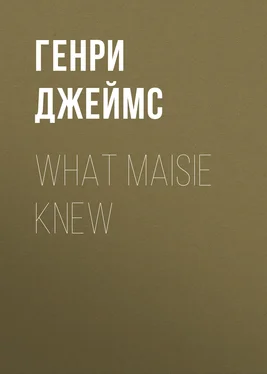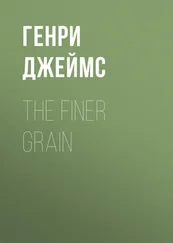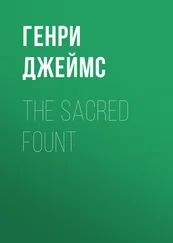Генри Джеймс - What Maisie Knew
Здесь есть возможность читать онлайн «Генри Джеймс - What Maisie Knew» — ознакомительный отрывок электронной книги совершенно бесплатно, а после прочтения отрывка купить полную версию. В некоторых случаях можно слушать аудио, скачать через торрент в формате fb2 и присутствует краткое содержание. Жанр: foreign_children, foreign_antique, foreign_prose, на английском языке. Описание произведения, (предисловие) а так же отзывы посетителей доступны на портале библиотеки ЛибКат.
- Название:What Maisie Knew
- Автор:
- Жанр:
- Год:неизвестен
- ISBN:нет данных
- Рейтинг книги:4 / 5. Голосов: 1
-
Избранное:Добавить в избранное
- Отзывы:
-
Ваша оценка:
- 80
- 1
- 2
- 3
- 4
- 5
What Maisie Knew: краткое содержание, описание и аннотация
Предлагаем к чтению аннотацию, описание, краткое содержание или предисловие (зависит от того, что написал сам автор книги «What Maisie Knew»). Если вы не нашли необходимую информацию о книге — напишите в комментариях, мы постараемся отыскать её.
What Maisie Knew — читать онлайн ознакомительный отрывок
Ниже представлен текст книги, разбитый по страницам. Система сохранения места последней прочитанной страницы, позволяет с удобством читать онлайн бесплатно книгу «What Maisie Knew», без необходимости каждый раз заново искать на чём Вы остановились. Поставьте закладку, и сможете в любой момент перейти на страницу, на которой закончили чтение.
Интервал:
Закладка:
It was on account of these things that mamma got her for such low pay, really for nothing: so much, one day when Mrs. Wix had accompanied her into the drawing-room and left her, the child heard one of the ladies she found there—a lady with eyebrows arched like skipping-ropes and thick black stitching, like ruled lines for musical notes on beautiful white gloves—announce to another. She knew governesses were poor; Miss Overmore was unmentionably and Mrs. Wix ever so publicly so. Neither this, however, nor the old brown frock nor the diadem nor the button, made a difference for Maisie in the charm put forth through everything, the charm of Mrs. Wix's conveying that somehow, in her ugliness and her poverty, she was peculiarly and soothingly safe; safer than any one in the world, than papa, than mamma, than the lady with the arched eyebrows; safer even, though so much less beautiful, than Miss Overmore, on whose loveliness, as she supposed it, the little girl was faintly conscious that one couldn't rest with quite the same tucked-in and kissed-for-good-night feeling. Mrs. Wix was as safe as Clara Matilda, who was in heaven and yet, embarrassingly, also in Kensal Green, where they had been together to see her little huddled grave. It was from something in Mrs. Wix's tone, which in spite of caricature remained indescribable and inimitable, that Maisie, before her term with her mother was over, drew this sense of a support, like a breast-high banister in a place of "drops," that would never give way. If she knew her instructress was poor and queer she also knew she was not nearly so "qualified" as Miss Overmore, who could say lots of dates straight off (letting you hold the book yourself), state the position of Malabar, play six pieces without notes and, in a sketch, put in beautifully the trees and houses and difficult parts. Maisie herself could play more pieces than Mrs. Wix, who was moreover visibly ashamed of her houses and trees and could only, with the help of a smutty forefinger, of doubtful legitimacy in the field of art, do the smoke coming out of the chimneys. They dealt, the governess and her pupil, in "subjects," but there were many the governess put off from week to week and that they never got to at all: she only used to say "We'll take that in its proper order." Her order was a circle as vast as the untravelled globe. She had not the spirit of adventure—the child could perfectly see how many subjects she was afraid of. She took refuge on the firm ground of fiction, through which indeed there curled the blue river of truth. She knew swarms of stories, mostly those of the novels she had read; relating them with a memory that never faltered and a wealth of detail that was Maisie's delight. They were all about love and beauty and countesses and wickedness. Her conversation was practically an endless narrative, a great garden of romance, with sudden vistas into her own life and gushing fountains of homeliness. These were the parts where they most lingered; she made the child take with her again every step of her long, lame course and think it beyond magic or monsters. Her pupil acquired a vivid vision of every one who had ever, in her phrase, knocked against her—some of them oh so hard!—every one literally but Mr. Wix, her husband, as to whom nothing was mentioned save that he had been dead for ages. He had been rather remarkably absent from his wife's career, and Maisie was never taken to see his grave.
V
The second parting from Miss Overmore had been bad enough, but this first parting from Mrs. Wix was much worse. The child had lately been to the dentist's and had a term of comparison for the screwed-up intensity of the scene. It was dreadfully silent, as it had been when her tooth was taken out; Mrs. Wix had on that occasion grabbed her hand and they had clung to each other with the frenzy of their determination not to scream. Maisie, at the dentist's, had been heroically still, but just when she felt most anguish had become aware of an audible shriek on the part of her companion, a spasm of stifled sympathy. This was reproduced by the only sound that broke their supreme embrace when, a month later, the "arrangement," as her periodical uprootings were called, played the part of the horrible forceps. Embedded in Mrs. Wix's nature as her tooth had been socketed in her gum, the operation of extracting her would really have been a case for chloroform. It was a hug that fortunately left nothing to say, for the poor woman's want of words at such an hour seemed to fall in with her want of everything. Maisie's alternate parent, in the outermost vestibule—he liked the impertinence of crossing as much as that of his late wife's threshold—stood over them with his open watch and his still more open grin, while from the only corner of an eye on which something of Mrs. Wix's didn't impinge the child saw at the door a brougham in which Miss Overmore also waited. She remembered the difference when, six months before, she had been torn from the breast of that more spirited protectress. Miss Overmore, then also in the vestibule, but of course in the other one, had been thoroughly audible and voluble; her protest had rung out bravely and she had declared that something—her pupil didn't know exactly what—was a regular wicked shame. That had at the time dimly recalled to Maisie the far-away moment of Moddle's great outbreak: there seemed always to be "shames" connected in one way or another with her migrations. At present, while Mrs. Wix's arms tightened and the smell of her hair was strong, she further remembered how, in pacifying Miss Overmore, papa had made use of the words "you dear old duck!"—an expression which, by its oddity, had stuck fast in her young mind, having moreover a place well prepared for it there by what she knew of the governess whom she now always mentally characterised as the pretty one. She wondered whether this affection would be as great as before: that would at all events be the case with the prettiness Maisie could see in the face which showed brightly at the window of the brougham.
The brougham was a token of harmony, of the fine conditions papa would this time offer: he had usually come for her in a hansom, with a four-wheeler behind for the boxes. The four-wheeler with the boxes on it was actually there, but mamma was the only lady with whom she had ever been in a conveyance of the kind always of old spoken of by Moddle as a private carriage. Papa's carriage was, now that he had one, still more private, somehow, than mamma's; and when at last she found herself quite on top, as she felt, of its inmates and gloriously rolling away, she put to Miss Overmore, after another immense and talkative squeeze, a question of which the motive was a desire for information as to the continuity of a certain sentiment. "Did papa like you just the same while I was gone?" she enquired—full of the sense of how markedly his favour had been established in her presence. She had bethought herself that this favour might, like her presence and as if depending on it, be only intermittent and for the season. Papa, on whose knee she sat, burst into one of those loud laughs of his that, however prepared she was, seemed always, like some trick in a frightening game, to leap forth and make her jump. Before Miss Overmore could speak he replied: "Why, you little donkey, when you're away what have I left to do but just to love her?" Miss Overmore hereupon immediately took her from him, and they had a merry little scrimmage over her of which Maisie caught the surprised perception in the white stare of an old lady who passed in a victoria. Then her beautiful friend remarked to her very gravely: "I shall make him understand that if he ever again says anything as horrid as that to you I shall carry you straight off and we'll go and live somewhere together and be good quiet little girls." The child couldn't quite make out why her father's speech had been horrid, since it only expressed that appreciation which their companion herself had of old described as "immense." To enter more into the truth of the matter she appealed to him again directly, asked if in all those months Miss Overmore hadn't been with him just as she had been before and just as she would be now. "Of course she has, old girl—where else could the poor dear be?" cried Beale Farange, to the still greater scandal of their companion, who protested that unless he straightway "took back" his nasty wicked fib it would be, this time, not only him she would leave, but his child too and his house and his tiresome trouble—all the impossible things he had succeeded in putting on her. Beale, under this frolic menace, took nothing back at all; he was indeed apparently on the point of repeating his extravagance, but Miss Overmore instructed her little charge that she was not to listen to his bad jokes: she was to understand that a lady couldn't stay with a gentleman that way without some awfully proper reason.
Читать дальшеИнтервал:
Закладка:
Похожие книги на «What Maisie Knew»
Представляем Вашему вниманию похожие книги на «What Maisie Knew» списком для выбора. Мы отобрали схожую по названию и смыслу литературу в надежде предоставить читателям больше вариантов отыскать новые, интересные, ещё непрочитанные произведения.
Обсуждение, отзывы о книге «What Maisie Knew» и просто собственные мнения читателей. Оставьте ваши комментарии, напишите, что Вы думаете о произведении, его смысле или главных героях. Укажите что конкретно понравилось, а что нет, и почему Вы так считаете.












